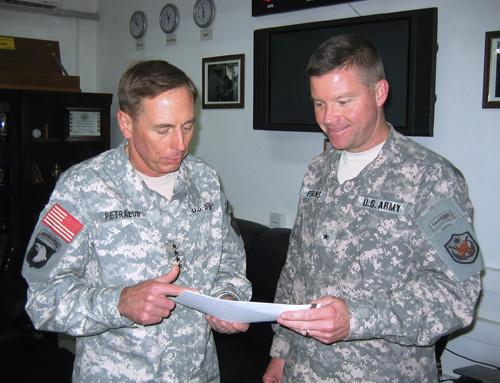Petraeus: Al Qaeda will divert to Afghanistan

Gen. David Petraeus, left, the top U.S. commander in Iraq, talks with Brig. Gen. David Perkins, the top spokesman for the U.S., military command in Baghdad, in his office at the U.S. Embassy in Baghdad on Saturday. Al-Qaeda may be diverting fighters to th Robert Burns, The Associated Press
Jul 21, 2008
Last updated on May 13, 2016 at 12:31 p.m.
BAGHDAD – After intense U.S. assaults, al-Qaeda may be considering shifting focus to its original home base in Afghanistan, where American casualties are running higher than in Iraq, the top U.S. commander in Iraq said Saturday.
“We do think that there is some assessment ongoing as to the continued viability of al-Qaeda’s fight in Iraq,” Gen. David Petraeus told The Associated Press in an interview at his office at the U.S. Embassy.
Whatever the result, Petraeus said no one should expect al-Qaeda to give up entirely in Iraq.
“They’re not going to abandon Iraq. They’re not going to write it off. None of that,” he said. “But what they certainly may do is start to provide some of those resources that would have come to Iraq to Pakistan, possibly Afghanistan.”
Get The Daily Illini in your inbox!
He said there are signs that foreign fighters recruited by al-Qaeda to do battle in Iraq are being diverted to the largely ungoverned areas in Pakistan from which the fighters can cross into Afghanistan. U.S. officials have pressed Pakistan for more than a year to halt the cross-border infiltration. It remains a major worry not only for the war in Afghanistan but also for Pakistan’s stability.
Discussing al-Qaeda in cautious terms, Petraeus said he is not certain of the reliability of the intelligence information about the terrorist network’s latest thinking. He was adamant, however, that until now al-Qaeda has seen Iraq as its best opportunity for establishing a militant Islamic state closer to the Persian Gulf.
“That could be under review,” Petraeus said. “We do think they are considering what should be the main effort.”
He offered a mostly upbeat assessment of conditions in Iraq just weeks before he is to make a recommendation on whether to further reduce U.S. troop levels. Petraeus said the country is showing fresh signs of promise not only on the security front, where insurgent attacks are down sharply, but also politically.
He applauded the latest evidence of movement toward reconciliation by Sunnis and Shiites – the announcement Saturday that Iraq’s largest Sunni Arab political bloc had ended a nearly yearlong boycott of the Shiite-led government.
“It’s a very important step forward,” Petraeus said after an aide interrupted the AP interview to deliver the news. The general flashed a wide smile and instructed the aide to pass along his congratulations to top government officials, who have come under enormous pressure from U.S. officials to reconcile.
Petraeus declined to say what he might recommend to President Bush regarding further U.S. troops reductions. The assessment, he said, is based on a range of factors, including the prospects for Iraqi government approval of legislation required before provincial elections can be held this fall.
He would not talk about specific troop levels later this year. But the enthusiasm of Petraeus’s description of security, political and even economic progress in 2008 gave the impression he may be inclined to tell Bush that fewer than the current 15 combat brigades will be needed by year’s end.
Petraeus said he was encouraged at the possibility of al-Qaeda reconsidering Iraq as its highest priority war front.
“There is some intelligence that has picked this up,” he said, adding, “It’s not solid gold intelligence.”





